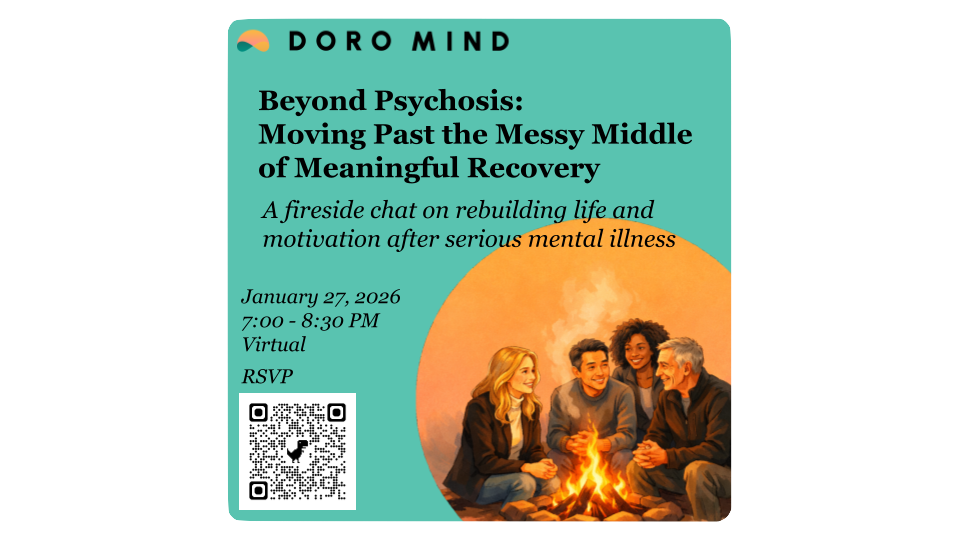
Aug 27, 2024
ResearchHearing Voices: 5 Things You Can Do If Someone You Care About Is Hearing Voices

I’ve spent countless hours trying to convince my brother that the voices in his head weren’t real. Years later, he’s convinced me that they are.
It’s normal to feel concerned when a loved one hears voices. You might fear that the voices, also known as auditory hallucinations, are a symptom of a lifelong severe mental illness. You might try to deny or explain away the experience for yourself and your loved one: maybe the TV was on in the other room, or maybe it was a dream. This is how I felt when I first learned that my brother was hearing voices.
If your loved one tells you that they are hearing voices, here are 5 tips that you can follow to be supportive of their needs.
1. Validate and Empathize
When first learning about a loved one’s voices, a common gut reaction is to deny their experience, or try convincing them that the voices aren’t real. The problem is: the experience is very real to your loved one. When you try to convince them that it isn't, you may drive a wedge between the two of you and suggest to your loved one that they should hide or suppress what they’re going through.
Even though it's difficult to imagine what it's like to hear voices, it's important to show your loved one that you're willing to listen and try to understand what they're experiencing.
Rather than fixate on what the voices are saying, try to empathize with the feelings that your loved one is expressing. If your loved one is expressing paranoia and is distressed by the voices, you can acknowledge that feeling, and offer to help them feel safer in their environment.
The goal is for your loved one to feel comfortable reaching out to you for support if the voices become distressing.
2. Be curious
If your loved one is open to it, ask them to describe the voices to you. Is it one voice or many? Who are they? When did they arrive? What do they like to talk about?
The purpose isn’t to interrogate your loved one or convince them that the voices aren’t real, but to better understand what their experience is like. Having this discussion can help you gain better insight into the purpose that the voices serve in their lives. This also helps to make the experience of hearing voices feel less ominous, more manageable, and sometimes even valuable.
Recently, inspired by the Working with Voices workbook by Ron Coleman & Mike Smith, I asked my brother if I could speak to one of his voices. Without hesitation, he said, “Yes!” and I was able to share a few messages back and forth with one of his voices. It was a brief interaction, but I felt gratitude that my brother was willing to share his experience with me.
3. Learn more about voice hearing
It’s estimated that 1 out of every 10 people will experience hearing voices at some point in their lives. Voices can be distressing or they can be positive. A person may hear voices once, for a period of time, or continuously throughout their lives.
Voices are sometimes described as thoughts and emotions that are hard to cope with like difficult feelings stemming from trauma that our brains externalize to for our own protection.
You can find many simulations of voice hearing on YouTube and social media. My brother says that this simulation of a person hearing distressing voices is similar to his own experience.
The experience of hearing voices is often associated with a severe mental illness. However, it’s not true that every person requires a diagnosis or medication to manage their voices. In fact, many people live well with voices. Many voice hearers find that the key to living well with voices is to change their relationship with the voices. You can find powerful examples of this in the book Living with Voices: 50 stories of recovery.
The more you learn about the experience of hearing voices, the more you can understand and empathize with what your loved one is going through.
4. Connect your loved one with peers
Learning from other voice hearers can be an incredibly powerful experience for you and your loved one.
The Hearing Voices Network is a wonderful resource which offers peer support groups where voice hearers can share their experiences without judgment.
Recently, I joined a Hearing Voices Network support group with my brother. He was able to ask others questions about their experiences. We discovered that voices have lots of variety: some seem to be spirits, others animals, others ancestors. This was a valuable insight for both of us.
My brother has also found it helpful to discuss voices with peers at the mental health clinic he attends. He’s even been able to share with friends tips to manage the voices that have worked for him: like closing his window so that the voices don’t come in or writing a request on a piece of paper for the voices to stop and give him a break.
5. Connect your loved one with professionals
If your loved one is distressed, you can offer to connect them to a mental health professional who can assess whether or not a diagnosis and, therefore, treatment might be appropriate. Keep in mind that diagnoses are tools intended to support your loved one and guide their treatment.
Diagnoses often change over time, and it’s never helpful to identify your loved one solely by their psychiatric diagnosis. Some voice hearers benefit from medication that can be prescribed by a psychiatrist, but medication isn’t the only option.
CBT for psychosis (CBTp) and Compassion Focused Therapy are two types of therapy that can help a person learn to effectively manage auditory hallucinations.
If your loved one has recently started hearing voices, you might investigate First Episode Psychosis programs in your area that can help evaluate your loved one. These programs often include family members in the treatment process.
Conclusion
It can be very difficult to accept that your loved one hears voices and to understand what that experience is like. I know, it took me over a decade to stop arguing with my brother and start listening. Once you accept that your loved one may be experiencing a reality different than yours, there are many ways that you can be supportive. At Doro Mind, we’ve developed a program to help friends and family members like you build the knowledge and skills to better support your loved one when mental health challenges arise.
Author
Matthew Montañez
Matthew is the formerCo-founder and CTO of Akin Mental Health. He is passionate about finding ways to support families navigating mental illness based on his own experience with his brother.





